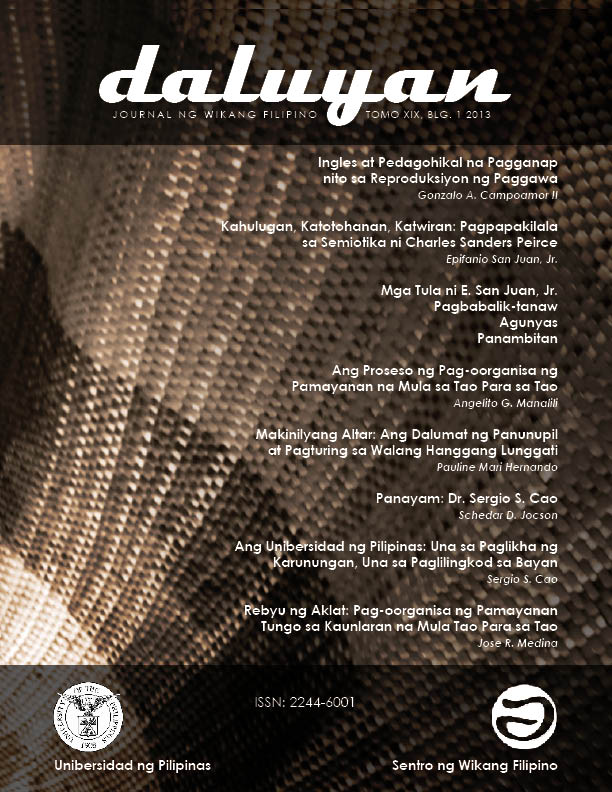Kahulugan, Katotohanan, Katwiran: Pagpapakilala sa Semiotika ni Charles Sanders Peirce
Abstract
Bagamat dumadanas ng muling-pagsilang ang pragmatismong inimbento ni Charles Sanders Peirce, hindi pa talagang kilala ang semiotika niya. Laganap ang pragmatismong bulgar ni William James. Unti-unting natutuklasan na ang makarealistikong semiotika ni Peirce, salungat sa nominalismong pananaw, tulad ng semiolohiya ni Saussure na siyang batayan ng dekonstruktibong ideolohiyang aprubado noong panahon ng Cold War. Sinubok dito na ilagom ang prinsipyong ugat ng semiotika ni Peirce at ilapat iyon sa isang eksperimental na pagpapakahulugan ng dalawang akda sa literaturang Pilipino. Hindi pa naipapaliwanag nang husto ang bawat konsepto sa semiotika–pumanaw si Peirce nang hindi niya lubos nabigyan ng sistematikong kaayusan ang teorya, palibhasa'y nakatuon sa pagwawasto ng mga kamalian nina James at ibang alagad tungkol sa tahasang diin ng pragmatismo sa panlipunang ugali o praktika sa pagsisiyasat ng publikong katotohanan at katwiran sa realidad.
Mga Susing Salita: pragmatismo, katotohanan, senyal, kahulugan, interpretant, paniniwala, ugali, katwiran
Although pragmatism has been experiencing a renaissance in philosophy in general, Charles Sanders Peirce, the "inventor" of this anti-Cartesian/anti-Kantian method of clarifying meaning remains unknown. William James's vulgarized version has overshadowed Peirce's highly original theory of "pragmaticism" grounded on semiotics. Now recognized as more testable than Saussure's binary semiology (the foundation of post-structuralist textualisms) which Cold War politics and ideology popularized. Peirce's triadic sign-theory operates within a scientific realist framework opposed to nominalism and relativist nihilism. This essay outlines the general schema of Peirce's semiotics and then presents a hypothetical reading of two classic texts of Filipino literature as an experiment in testing the virtues and limitations of Peirce's potentially heuristic but complex theory of meaning and interpretation, still in the process of being sorted out and applied.
Keywords: pragmatism, truth, sign, meaning, interpretant, belief, reason
'>
English as the primary condition to Civil Service employment during the American colonial period was a crucial factor to the language’s quick spread. During the Commonwealth and the post-war era, it remained as a lasting educational component of the imperialist agenda delayed only by deficiencies in the socio-economic and educational structure and the emergence of several state-led linguistic nationalist phases. In the recent years, there have been renewed state and private efforts to strengthen the role of English in education supposedly in response to the ever-growing local unemployment. The paper, tracing English language’s role in education and employment in various historical conditions, argues that the renewed efforts are mainly responses to market-led reservations and the demands of the neoliberal global finance at the expense of the national language and the country’s general education.
Keywords: English, politics of language, language of instruction, reproduction of labor, neoliberalism


